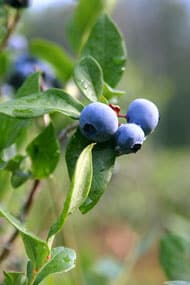All require full sun and well-drained soil, and some require higher levels of maintenance than others.
Blueberries are among the easiest fruits to grow. They can grow to a height of six to ten feet unless pruned to be kept smaller. The plants require acidic soil since they have a high requirement for iron, and this element is more available for the plant to absorb at a lower, more acidic pH. More than one variety of blueberries needs to be planted for cross-pollination in order for fruit to set. Many varieties are available, but they are grouped into early, mid, and late-season bloomers. You need to make sure you have at least two varieties from one of these blooming times.
Blackberries do not require more than one variety for cross pollination and are quite easy to grow. Some varieties are erect while others are trailing, meaning they have a vine-like growth habit and require support. Thorn-less varieties are also available. The plants have two types of branches or canes. The first year, the canes only have leaves. In the second year, they form flowers and fruits. Afterwards, the canes die. After fruit has been picked, the canes should be removed.
Most raspberries do not perform well in Georgia due to our heat. However, a few varieties, such as ‘Caroline’ and ‘Dorman Red’, can tolerate our climate and produce abundant fruit. They form fruit on canes as raspberries do. Raspberries do not store well and should be consumed shortly after harvesting.
Fig trees are a good choice for homeowners. When I was growing up, we had a large fig tree in the backyard that yielded many figs in the late summer. The fruits are like ‘blobs of jelly’ and can be quite sweet. They require minimal maintenance. ‘Brown Turkey’ and ‘Celeste’ are the two varieties that perform well in our area. The drawback to figs is they are not real cold hardy. If the temperatures dip below 20 degrees, the plants can suffer damage and sometimes are killed back to the ground. However, new branches will grow back but will not bear any figs in the following growing season. Planting the trees next to brick walls with a southern or western exposure or in areas that are somewhat protected will help reduce the likelihood of cold damage.
Apples, pears and plums are more of a challenge to grow. Peaches are especially difficult since they are afflicted with many pests and have to be sprayed multiple times during the growing season. Therefore, the Extension Service does not recommend peaches for homeowners. The other larger fruit trees can be planted in the home landscape and, with proper maintenance and care, will produce fruit. However, they are not as simple to grow as the smaller fruit-bearing plants.
If you have never planted any fruiting plants, consider doing so. They will produce fresh tasty fruit if planted in the right place and given proper care. Gwinnett County Extension is offering several fruiting plants as part of 2015 annual plant sale. Several varieties of blueberries, blackberries, raspberries and figs are available at affordable prices. For more information and to get an order form, go to the Extension website at http://www.caes.uga.edu/extension/gwinnett/ and click on ‘news and events’ to download the order form. You can also call the Gwinnett County Extension office for one to be mailed to you.
Timothy Daly, is an Agricultural and Natural Resource Extension Agent with Gwinnett County. He can be contacted at 678-377-4010 or tdaly@uga.edu


